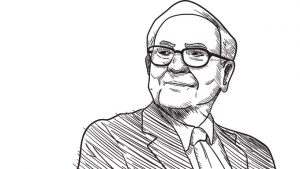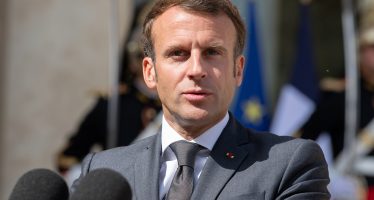From Bear to Bull: Warren Buffett Casts a Vote of Confidence in US Stock Market
 A perennial favourite of investors, the snowclone ‘What Would Warren Do?’, has an answer. Warren buys oil and other blue chips that show exceptional generosity towards shareholders. Over the first quarter, Warren Buffett’s Berkshire Hathaway ploughed some $41bn of its $147bn cash pile, mostly insurance float, into the stock market.
A perennial favourite of investors, the snowclone ‘What Would Warren Do?’, has an answer. Warren buys oil and other blue chips that show exceptional generosity towards shareholders. Over the first quarter, Warren Buffett’s Berkshire Hathaway ploughed some $41bn of its $147bn cash pile, mostly insurance float, into the stock market.
The company upped its stake in energy company Chevron to $25.9bn and purchased 121m shares of printer manufacturer HP, worth $4.2bn. In March, Berkshire Hathaway dropped $11.6bn into the takeover of Alleghany, a sprawling conglomerate built around a core of insurance and reinsurance businesses with a bewildering portfolio of add-on manufacturing pursuits stretching from toys to funeral home supplies and custom trailers.
That diversity sits well with Berkshire Hathaway which, as an investment vehicle, suffered a dearth of opportunities over the past few years. The company’s last grand takeover – the 2016 buyout of Portland-based metal components manufacturer Precision Castparts Corp for $37bn – resulted in a $9.8bn write-down that dampened spirits and saw Mr Buffett gradually retreat from Wall Street and forgo major acquisitions.
Lustre Lost
In a remarkably bearish mood, Mr Buffett in 2019 predicted that returns from Berkshire Hathaway would “closely track” the overall stock market – which is precisely what transpired. However, Mr Buffett’s renown as the world’s most astute stock picker suffered a dent when he failed to take advantage of the corona crisis that hit markets in early 2020 before unleashing a phenomenal rebound only weeks later.
Mr Buffett also seemed to have lost his nerve during this brief downturn, selling his $8bn stake in the four largest US carriers at the bottom of the market and only weeks after buying into the airlines. He also significantly trimmed his holdings in Goldman Sachs and JPMorgan Chase. At the 2020 meeting with Berkshire Hathaway shareholders – an online-only event due to the pandemic – Mr Buffett likened his exiting the market to pulling a train from the mainline onto the siding. Of course, the Berkshire Hathaway train briefly threatened to derail in the wake of the 2008/9 financial crisis.
Likewise, a $10bn bet on Occidental Petroleum went sour in April 2020 after the heavily indebted oil major – the largest domestic oil producer in the US – paid its controversial 8% dividend on Mr Buffett’s preferred stock in shares rather than cash. News of the dilution sent Occidental stock tumbling 12%, triggering short-sale limits and slashing Berkshire Hathaway’s equity.
Before disaster struck, Mr Buffett compared his $10bn investment at an 8% cash dividend as ‘taking candy from a baby’.His cash injection helped Occidental finance its $55bn takeover of rival Anadarko, a much-discussed move that saddled the company with debt just before oil prices collapsed in the first months of the Corona Pandemic. Since then, Mr Buffett has grown sweet again on Occidental, expanding his stake to 14% of the company in February.
Yield Rules
The first in-person Berkshire Hathaway shareholder meeting – aka Woodstock for Capitalists – since the start of the pandemic took place in downtown Omaha, Nebraska, on Saturday, 30 April. The 91-year-old sage/oracle, whisked around the venue in a golfcart, whilst subtly indicated that he has gained a renewed appreciation for yield. Explaining his recent equity purchases, Mr Buffett pointed to oil major Chevron which is returning most of its free cash flow to shareholders.
Berkshire Hathaway is now all about buying into shareholder yield, defined as dividends plus buybacks divided by market capitalisation. In the case of Chevron, that yield hovers around the 5%-mark, based on the company’s first quarter repurchases of stock. Mr Buffett remains sceptical of tech stocks (HP being the noteworthy exception) even though Meta Platforms (Facebook) and eBay boast yields of 10% and 26% respectively. Over the last year, online marketplace eBay bought back some $7.2bn worth of its own stock.
Apparently done with sitting on the sideline, Mr Buffett seeks to burnish his credentials with an inflation hedge that exposes Berkshire Hathaway to considerable upside. Answering questions during the Omaha event, he dismissed the company’s losses on its investment and derivatives portfolio – a $1.6bn hit – as “generally meaningless” because of US accounting rules.
The company reported quarterly operating earnings of $7bn, slightly over last year’s, with stronger profits at three of its four core sectors – logistics, utilities, and manufacturing. However, profits at its insurance business evaporated with Geico registering an underwriting loss and overall results plummeting to barely $47m, down from $764m last year.
Casino Capitalism
Calling the US financial markets “almost totally a casino”, Mr Buffett noted that the money is in “turning over stocks.” He added that the rapid pace of trading, the hallmark of retail investors, allowed Berkshire to make its own large bets: “Large companies in America became poker chips and people were buying and selling three-day and two-day calls. That excitement has now gone.”
Berkshire Vice-Chairperson and consiglieri Charlie Munger took aim at Robinhood – the online brokerage that brought stock trading to Main Street America – and mused that “God is getting just” as evidenced by company’s spectacular fall from grace. Robinhood saw its valuation tumble from $60bn in August 2021 to barely $8.5bn last week: “Short term gambling and big commissions; it was disgusting.”
For more than five hours Messrs Buffett and Munger took questions from the thousands who had made the annual pilgrimage to Omaha to pay their respects and hear a word from the wise. Also present were vice-chairs Ajit Jain and Greg Abel, the latter heir apparent to Mr Buffett. However, investors did not get all the answers they asked for. The oracle remained silent on topics such as the war in Ukraine, the economic slowdown in China, and the resilience of the US economy.
Charlie’s Take
Shareholder proposals to require the company to disclose the size of its environmental footprint and divulge its efforts to diversify its workforce were voted down. Mr Buffett rejected whispered suggestions that he may inadvertently have wrongfooted investors by bemoaning the lack of “appealing investments” in his February newsletter just moments before embarking on a buying spree: “During the market sell-off earlier this year, a few stocks got very interesting to us.”
Mr Buffett assured his audience that the mood at Berkshire Hathaway headquarters has since become “lethargic.” By this, he seemed to suggest that no more big buys would be forthcoming. He also explained that the company needs to preserve a sizeable stash of cash given its insurance business: “We need to be in a position to operate if the economy stops and that can always happen.” Berkshire Hathaway’s holdings of cash and T-bills has dropped to $106bn, its lowest level since 2018.
Some of this year’s most acerbic and funny quotes out of Omaha were provided by Charlie Munger who, despite his almost centenarian status (he is 98), remains somewhat of a rabble-rousing visionary. His take on bitcoin was particularly priceless: “In my life I try to avoid things that are stupid and evil and make me look bad in comparison to somebody else. And bitcoin does all three.”
Commenting on the threat of nuclear war, Vice-Chair Ajit Jahin admitted that he has no clue about the company’s exposure to such an event: “When it comes to nuclear, I sort of surrender.”
You may have an interest in also reading…
Modern Modem Mobsters are Costing the World a Fortune
The internet has come a long way since the good old days of dial-up. It was slow but relatively safe.
Illusory Visions of Strategic Autonomy: Emmanuel Macron Wins France, Loses Europe
This Sunday, most French voters held their nose as they granted President Emmanuel Macron a second term in office. Faced
On Freeters and Other Exotic Creatures in a Land of Plenty
The sustainability of Japan’s society is in doubt for various reasons, writes Wim Romeijn. China, Europe, and even the United















































































